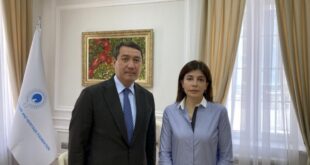
At the International Turkic Culture and Heritage Foundation within the framework of the event dedicated to the outstanding cultural figure of Azerbaijan and the entire Turkic world, composer, musicologist, publicist, playwright, pedagogue, author of the first opera and operetta in the East, founder of the Azerbaijan national music school Uzeyir Hajibeyli, a presentation ceremony of postage stamps issued in Spain under the auspices of the Foundation on the occasion of the 135th anniversary of the great composer was held.
The ceremony was attended by officials, ambassadors and representatives of the diplomatic corps accredited in Azerbaijan, as well as well-known figures of culture and art.
Emphasizing the importance of the event, President of the International Turkic Culture and Heritage Foundation Gunay Afandiyeva noted that every year the National Music Day in Azerbaijan is traditionally celebrated with a number of events: “Uzeyir Hajibeyli is one of those outstanding personalities who played an indisputable role in the upbringing of many generations, the formation of national thinking, national consciousness, as well as in the development of the culture and art of Azerbaijan and the entire Turkic world as a whole. The activities of Uzeyir bey, his life and creativity are so multifaceted that a large number of monographs are still being written and research is being conducted on each of them. Operas, musical comedies, immortal romances and other works of Uzeyir bey are the pearls of the musical treasury of the Turkic world. This year is historic for Azerbaijan and the entire Turkic world. Thanks to the decisive position of President of the Republic of Azerbaijan Mr. Ilham Aliyev and the inexhaustible courage of the Azerbaijani army, the ancestral lands were liberated from occupation. And now, the shot monument of Uzeyir bey is spared from these wounds, from this pain, because he has been reunited with his Motherland, is in his home. As Karabakh is an integral part, and Shusha is the cultural capital of Azerbaijan, the genius Uzeyir bey also represents the symbol of the country inextricably with them.”
Gunay Afandiyeva noted that in order to familiarize a wide international audience with the rich creativity of outstanding representatives of the culture and art of the Turkic world, a project on the publication of stamps is being implemented under the auspices of the International Turkic Culture and Heritage Foundation. The next postage stamps were issued and put into circulation in Spain on the occasion of the 135th anniversary of the great composer Uzeyir Hajibeyli.
Speaking at the event, Minister of Education of the Republic of Azerbaijan Emin Amrullayev spoke about the creativity of the great Uzeyir Hajibeyli and the invaluable contribution of the outstanding composer to the development of Azerbaijani musical culture. The Minister noted that the name of the founder of Azerbaijani music and an integral part of Azerbaijani national identity, Uzeyir bey, left an unprecedented and unrepeatable mark on the music and education of Azerbaijan. “Despite the fact that Azerbaijan has been subjected to various influences over the years, our music has managed to preserve its uniqueness.”
Emin Amrullayev spoke about the activities of Uzeyir bey not only in the development of Azerbaijani music, but also in the formation and promotion of education. The works created by him are once again proof of this.
Stressing the importance of studying and researching the heritage of the outstanding composer, the Minister noted that the Uzeyir Hajibeyli school will serve as an example both today and in the future: “The celebration of the birthday of Uzeyir Hajibeyli as the National Music Day is a significant event. I congratulate the entire musical community on this holiday. Taking this opportunity, I would like to congratulate the collective of the Baku Music Academy, once headed by Uzeyir bey, on the 100th anniversary”.
Thanking the president of the Foundation for organizing such important event, the Minister of Education said: “We must promote Azerbaijani music and culture in various forms, and the International Turkic Culture and Heritage Foundation performs this at a high level.”
Rector of the Baku Music Academy named after Uzeyir Hajibeyli, People’s Artist Farhad Badalbeyli made a speech and emphasized the importance of the event. “Uzeyir Hajibeyli is a holy person for each of us. And for me especially dear. In our family, the name Uzeyir bey has always been mentioned with great respect and love. For some time the academy ceased to bear the name of Uzeyir bey. Then, by the appropriate order of the beloved President of the Republic of Azerbaijan it was returned to our academy. Uzeyir bey is like a lump, he always showed us the way. Our music is gold. Such valuable musical figures as the students of Uzeyir bey: Fikret Amirov, Kara Karaev, Jahangir Jahangirov, Soltan Hajibeyov and others, are the pearls of our musical treasury,” said Farhad Badalbeyli.
“I am very glad that the event dedicated to Uzeyir bey is being held in the Turkic House, at the International Turkic Culture and Heritage Foundation. This is a significant event when the Uzeyir bey stamp is published in Spain and distributed throughout Europe,” Farhad Badalbeyli added.
Then, accompanied by Honored Artists of the Republic of Azerbaijan Sahib Pashazade on the tar and Kamran Karimov on the nagara, the postage stamp cancellation ceremony was held.
The stamps of Uzeyir Hajibeyli on the envelope were signed by President of the International Turkic Culture and Heritage Foundation Gunay Afandiyeva, Minister of Education of the Republic of Azerbaijan Emin Amrullayev and rector of the Baku Music Academy named after Uzeyir Hajibeyli Farhad Badalbeyli.
The event continued with performances by students of the Children’s Youth Development Center No. 3 and the Music School No. 26 named after Muslim Magomayev, who showed scenes from the works of the composer.
At the end, the children were presented with “Do it Yourself” books published by the Foundation based on the musical comedy “If not this one, that one” by Uzeyir Hajibeyli.
 Oval Useful news from Azerbaijan and Caucasus
Oval Useful news from Azerbaijan and Caucasus


